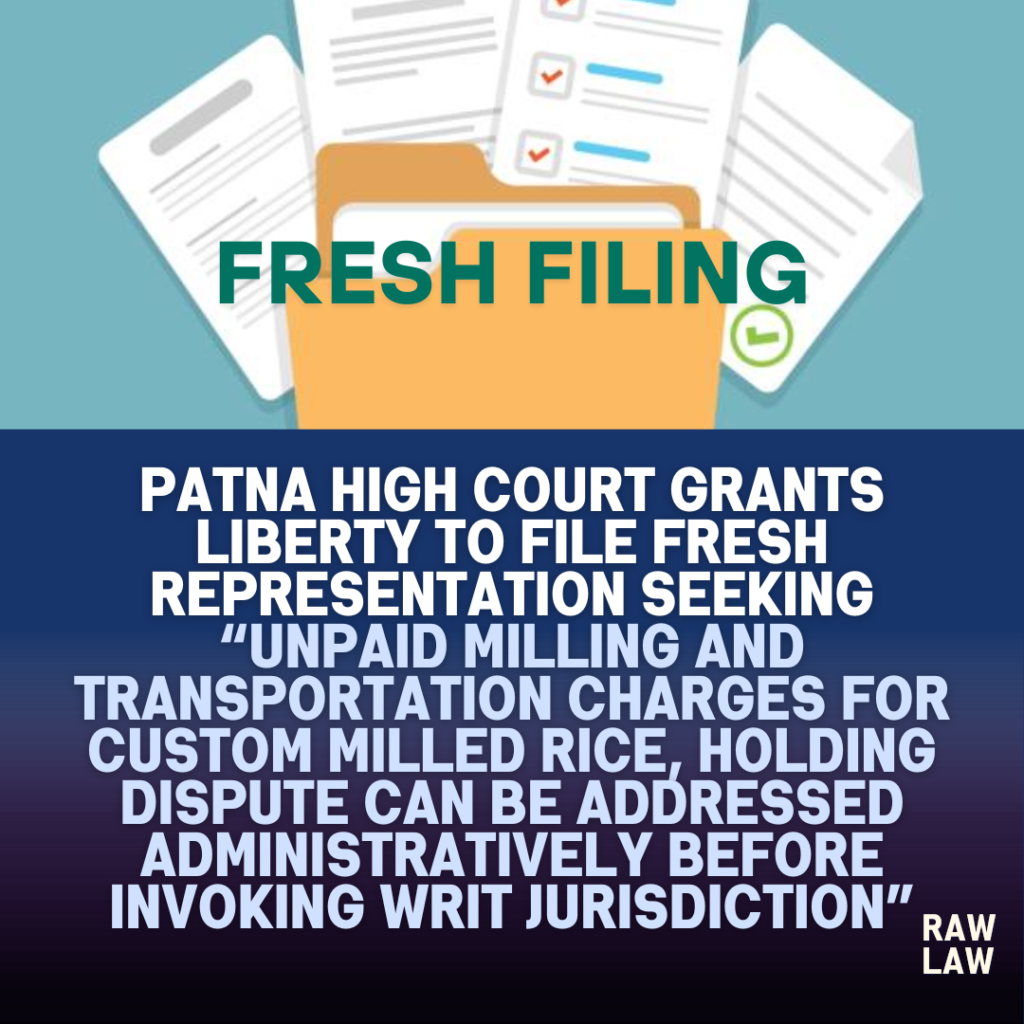Court’s Decision
The Patna High Court disposed of the writ petition, granting liberty to the petitioner to file a representation before the competent authority within four weeks seeking payment of unpaid milling, handling, and transportation charges under Letters dated 30 December 2015, and directed the authority to decide the representation within three months of filing. The Court declined to adjudicate on merits at this stage, keeping open all rights.
Facts
The petitioner, a rice mill, sought payment of ₹67,709 and ₹2,87,595 towards milling, handling, and transportation charges of custom milled rice for procurement years 2013-14 and 2014-15, with 12% simple interest, under Letters No. 1730 and 1731 dated 30 December 2015 issued by the District Manager, Bihar State Food and Civil Supplies Corporation, Chhapra. Claiming non-payment despite clear entitlement under these letters, the petitioner approached the High Court under Article 226 seeking directions for immediate payment.
Issues
- Whether the petitioner is entitled to direct payment under the Letters issued for milling and handling charges without first exhausting administrative remedies.
- Whether the High Court should exercise writ jurisdiction for payment disputes where alternative administrative avenues are available.
Petitioner’s Arguments
The petitioner argued:
- The amounts under Letters No. 1730 and 1731 were undisputed and pending since 2013-15.
- Despite repeated requests, the respondents failed to clear the dues, necessitating writ intervention.
- The petitioner was suffering financial hardship due to delayed payment for services rendered under the Public Distribution System supply chain.
Respondent’s Arguments
During the hearing, the respondents did not press merits but contended:
- The petitioner should file a representation before the appropriate authority, enabling the department to verify and process the claim under applicable guidelines.
- The dispute was administrative in nature, and the writ should not be entertained without exhausting this remedy.
Analysis of the Law
The Court examined:
- The scope of writ jurisdiction under Article 226, emphasising it is discretionary and should not be invoked if effective alternative remedies are available.
- The nature of the dispute being administrative (payment under a statutory scheme) rather than requiring constitutional adjudication.
- The balance between ensuring speedy payment to contractors under public distribution and the need for departmental scrutiny before payment.
Precedent Analysis
While no specific precedents were cited, the judgment aligns with:
- State of UP v. Mohd. Nooh (1958) and Whirlpool Corporation v. Registrar of Trademarks (1998): Alternative remedy must be exhausted before invoking writ jurisdiction.
- Union of India v. Poonam Mahajan (2003): Administrative remedies are to be utilised in monetary claims against the government.
Court’s Reasoning
The Court noted:
- The petitioner had an available administrative remedy to seek payment through representation before the competent authority.
- To avoid multiplicity of litigation and to facilitate a structured resolution, the petitioner should file a representation within four weeks.
- The competent authority was directed to decide the representation within three months, ensuring expeditious disposal while preserving the petitioner’s rights.
Conclusion
The Patna High Court:
- Disposed of the writ petition while granting liberty to the petitioner to file a representation within four weeks.
- Directed the competent authority to decide the representation within three months of its filing.
- Kept all rights and contentions open for the petitioner if required to pursue further remedies post decision.
Implications
- Reinforces that payment disputes involving government departments should first be resolved through administrative channels.
- Emphasises the High Court’s preference for exhausting remedies before invoking writ jurisdiction in monetary claims.
- Provides a structured, time-bound mechanism for resolution of payment disputes under PDS milling and handling services.
Short Note on Relevant Legal Position
- Whirlpool Corporation and State of UP v. Mohd. Nooh: Writ not maintainable if an alternative remedy exists.
- Poonam Mahajan: Payment disputes should first be resolved administratively.
- Article 226: Writ jurisdiction is discretionary and must be used judiciously.
FAQs
1. Can a rice mill approach the High Court directly for payment disputes under PDS milling contracts?
No, it must first file a representation before the competent authority to seek administrative resolution.
2. What is the timeline provided by the High Court for disposal of such representations?
The competent authority must decide within three months from the date of filing the representation.
3. Does the High Court adjudicate the merits of the payment dispute in such writ petitions?
No, it grants liberty to pursue remedies administratively before invoking writ jurisdiction.



